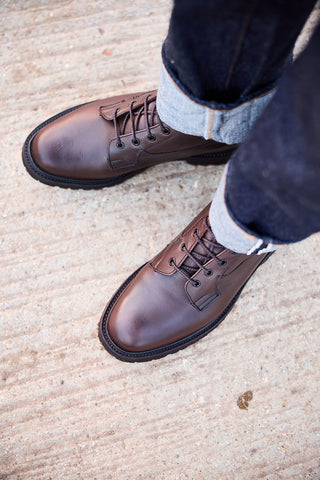There’s something quietly radical about investing in proper shoes. Fast fashion has made it unfortunately common to settle for poorly made alternatives with short lifespans, so choosing the kind built with time, skill and substance feels more special than ever.
But even the finest footwear isn’t immune to neglect.
When it comes to caring for fine leather footwear, most people think first of polish, brushes, or perhaps a good wax. Those are of course important, but one of the most effective tools for maintaining the look, feel and longevity of your shoes is something even more simple: the shoe tree.
At Tricker’s, where shoemaking has been perfected since 1829, a shoe tree is far from an afterthought. It’s an essential companion to every pair we make; the difference between footwear that merely endures and footwear that gets better with age.
Here’s what you need to know.
What is a Shoe Tree?
A shoe tree is a form-shaped insert that slips inside your shoe when it’s off your feet. Its job is simple; to hold the shape, prevents creases, and absorbs moisture - all while your shoes are taking a well-earned rest.
More than that, it helps reset the structure of the upper. Leather naturally moulds to the foot, which is part of its charm. But without support, that same leather can begin to sag and fold in all the wrong places. A shoe tree steps in to restore balance.
What Are Shoe Trees Made Of?
Not all shoe trees are equal, and the material they’re made from makes all the difference. Plastic trees exist, but they’re cheaper, lighter, and do very little. Tricker’s shoe trees are made from natural lime wood, and for good reason:
-
Moisture absorption: Lime wood draws out residual moisture and keeps odour in check.
-
A subtle, natural scent: Not synthetic. Not perfumed. Just clean, natural, and subtle.
-
Durability: Unlike plastic, wood doesn’t crack, bend or fatigue with time.
-
Breathability: Wood promotes airflow and helps shoes dry properly after wear.
The Benefits of Using a Shoe Tree
The upsides are numerous. By preserving structure, limiting wear, and helping materials recover between outings, shoe trees give your footwear a better chance at ageing well.
Here’s what a good shoe tree helps with:
-
Maintains shape: No more collapsed toe boxes or sunken vamps.
-
Reduces creasing: Prevents deep lines that can age a shoe before its time.
-
Manages moisture: Your feet perspire, even when you don’t notice. Left inside, that moisture shortens a shoe’s lifespan.
-
Extends longevity: Less stress on the leather means more years of wear.
-
Improves storage: Keeps shoes in good condition even when they’re not in rotation.
What Should (and Shouldn’t) They Be Used On?
Shoe trees are most effective, and indeed designed, for structured footwear made from quality leather. This includes:
-
Goodyear-welted shoes and boots
-
Oxfords, Derbies, brogues, monks and other formal leather styles
-
Leather boots with rigid uppers
They are not suitable for:
-
Trainers or sports shoes (which typically have fabric uppers and foam-based structure)
-
Soft slip-ons or moccasins without a defined toe box
-
Sandals, espadrilles, or other unstructured warm-weather shoes
A Note on Sizing
For a shoe tree to work as it should, fit is key. It needs to sit snugly enough to support the shape, without stretching the leather. Choose the correct size for your footwear, and never force a tree into place. Our wooden shoe trees are designed to align with Tricker’s sizing, offering the right level of support for every pair.
A Simple Tool with a Lasting Impact
A pair of handmade shoes is a statement about how you dress, what you value, and how you move through the world. A shoe tree is the quiet detail that keeps that statement looking sharp. It’s not glamorous, but in our eyes, it’s essential.
Explore our full range of premium shoe and boot trees:


